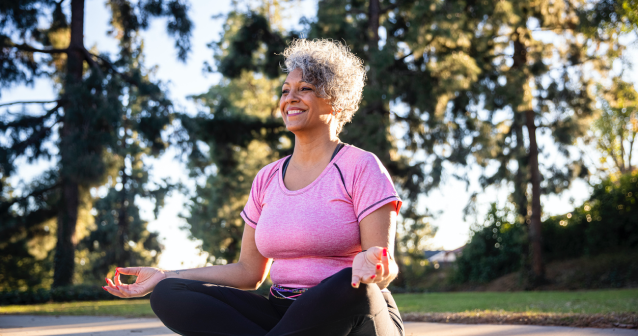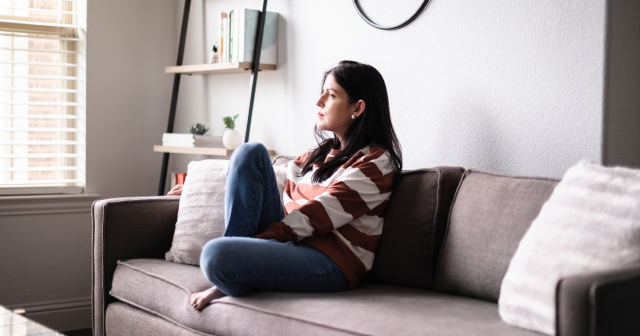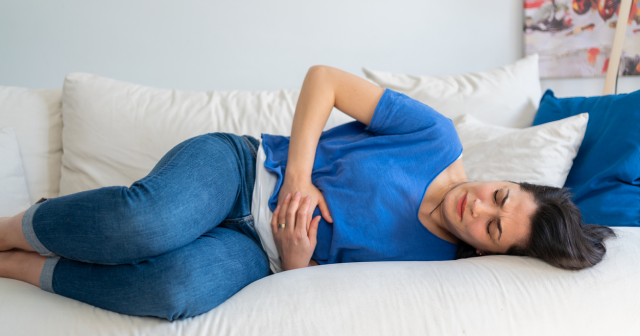Is dizziness a symptom of menopause?
Menopause takes place when periods have stopped and happens gradually over time; eventually getting pregnant will no longer be possible. This happens naturally to anyone born with female genitalia and normally occurs during middle age. It isn’t an illness or disease, but can cause symptoms due to the falling hormone levels in the body that occur at this time.
Dizziness around the time of the menopause is common. It may be related to problems that can occur around the menopause (such as hot flushes, anxiety or fatigue) or other medical problems such as ear or heart conditions. It’s a feeling that everything is spinning, a loss of balance or feeling as if you’re going to faint.
Symptoms of the menopause – including dizziness – may not require any treatment but if it’s needed then lifestyle changes and hormone therapy are sometimes helpful. There are also specific medical treatments available to help you deal with dizziness if required during the menopause.
What causes dizziness during the menopause?
Many of the causes of dizziness in the menopause are linked to the hormonal changes that happen in people with ovaries at this time. For up to several years before and just after menopause, levels of the hormones oestrogen and progesterone start to fall so that periods become irregular, and symptoms (such as hot flushes and dizziness) occur.
These hormone changes may trigger dizzy spells by affecting:
Your inner ear
The balance system of the body is found deep in your ears and hormone changes can affect this, causing a condition called benign paroxysmal positional vertigo (BPPV). This causes intense dizziness (short episodes of vertigo) when you move your head in certain directions. It’s different from other causes of dizziness, such as inflammation of the inner ear, problems with the heart rhythm or rate, and panic attacks or anxiety.
How well you sleep
Hot flushes can wake you up at night and so disturb your sleep, but the menopause can also affect the quality of your sleep in general without having hot flushes. This may make it more likely that you then feel tired or exhausted the next day, with dizziness arising as a result.

Your temperature
Hot flushes can make sleep difficult, and if you don’t sleep well this can cause fatigue and dizziness during the day. There may also be other associated symptoms such as sweating or palpitations.
Your mood
Anxiety and depression are common features of the menopause and may lead to severe stress and panic which can then cause dizziness. They may also cause severe tiredness that may make you feel dizzy.
Your blood sugar level
Because the hormone oestrogen plays a part in helping the body break down food into glucose (sugar), when levels of oestrogen vary the blood sugar levels alter. This means the body doesn’t receive a steady supply of energy and this may then cause tiredness and dizziness. Dizziness can also be a sign of diabetes with other common symptoms being feeling thirsty all the time, peeing a lot, tiredness, losing weight and having repeated infections. If you have such symptoms, seek medical attention from your doctor.
Migraine frequency
This type of headache becomes more common during the menopause and there’s a link between migraine and dizziness. If you get migraines before the menopause this may mean you’re likely to have them more frequently during it, including feeling dizzy more often. Vestibular migraines are a type of migraine where you experience a combination of vertigo, dizziness or balance problems, along with other migraine symptoms such as feeling sick or being sick, and sensitivity to light, sound or movement
Other possible causes of dizziness and the menopause include problems with both low and high blood pressure.
When to see a doctor about dizziness
If you’re menopausal and experiencing dizziness regularly but have no other symptoms, you should speak with your doctor for advice about this. They may want to examine you and check your blood pressure, pulse, ears and neck to see if movement – or your body position – affects your dizziness. They may also refer you to a doctor who is an expert in ear problems.
Call an ambulance or see your doctor immediately if you’ve recently suffered trauma to your head or neck, or if you have other symptoms linked to dizziness such as:
- severe headache, neck pain or a high temperature – these can be symptoms of meningitis
- blurred or double vision, difficulty speaking or slurred speech, numbness or tingling of the face or other part of the body, drooping of the eye or mouth, or altered consciousness – these can all be symptoms of a stroke
- chest pain, which can be a sign of angina or a heart attack, or a pulmonary embolism
- vomiting
- loss of hearing
- blacking out or fainting, which can occur as a result of conditions such as low blood pressure or aortic stenosis
If any of these symptoms happen very suddenly seek immediate medical advice as they can be a sign of these or other conditions such as a cerebellar stroke.
How to deal with dizziness during menopause
This depends on the cause of the dizziness. If it’s caused by low hormone levels, Hormone Replacement Therapy (HRT) may be prescribed for you. Anxiety or depression can be treated with counselling or antidepressant treatment, blood pressure problems can be treated with medication to keep it stable, and inner ear disease can be treated using anti-dizziness tablets. If your doctor refers you to a dizziness specialist they may arrange tests such as an MRI scan, or ultrasound blood flow tests of the head and neck.
Several lifestyle tips may help reduce dizziness in the menopause. These include drinking plenty of water to prevent dehydration, eating regular healthy meals to keep your blood sugar levels steady, speaking with family and friends about any anxiety and stress you may have, and standing up slowly after sleeping or sitting to avoid big changes in your blood pressure. Try to get enough sleep as this can help to reduce stress and worry, and activities such as yoga can improve your day-to-day balance.
If you have Benign Paroxysmal Positional Vertigo (BPPV) your doctor may try doing the Epley manoeuvre – a series of four movements of the head where, after each movement, the head is held in the same place for 30 seconds. This can be very effective but if it doesn’t work, your doctor may show you some exercises to do at home called Brandt-Daroff movements that involve a different way of moving the head.

What’s the outlook if I have dizziness in the menopause?
Symptoms linked to the menopause can improve after hormones settle down or if hormone replacement therapy is used. However, dizziness as a symptom in general tends to become more common with increasing age, and with the onset of other health problems that aren’t related to the menopause. This means that if you get dizziness that’s affecting your quality of life, or if it continues after the menopause, speak with your doctor about it.
Your health questions answered
What type of food should I eat to help prevent dizziness in the menopause?
 Answered by: Dr Roger Henderson
Answered by: Dr Roger HendersonTo help keep your blood sugar levels steady and reduce dizziness, eat regular balanced meals made from lean protein, healthy fats, and complex carbohydrates such as vegetables and whole grains. Try to avoid snacks that are high in fat and sugar (such as biscuits and crisps) and eat fruit, nuts or protein-based snacks instead. Remember to always drink plenty of water during and between meals to prevent dehydration as well. It can also be helpful to keep a journal of when you feel dizzy to see if your symptoms are linked to eating.
Key takeaways
- menopause isn’t an illness, it’s a normal event and may not cause any symptoms that affect your life
- if symptoms do occur, these are caused by the falling level of hormones in the body that happen at this time
- dizziness is one of the symptoms linked to the menopause
- simple lifestyle changes during the menopause can lessen or stop dizziness symptoms at this time
- hormone Replacement Therapy (HRT) can be very effective at reducing or preventing menopause symptoms, including dizziness






